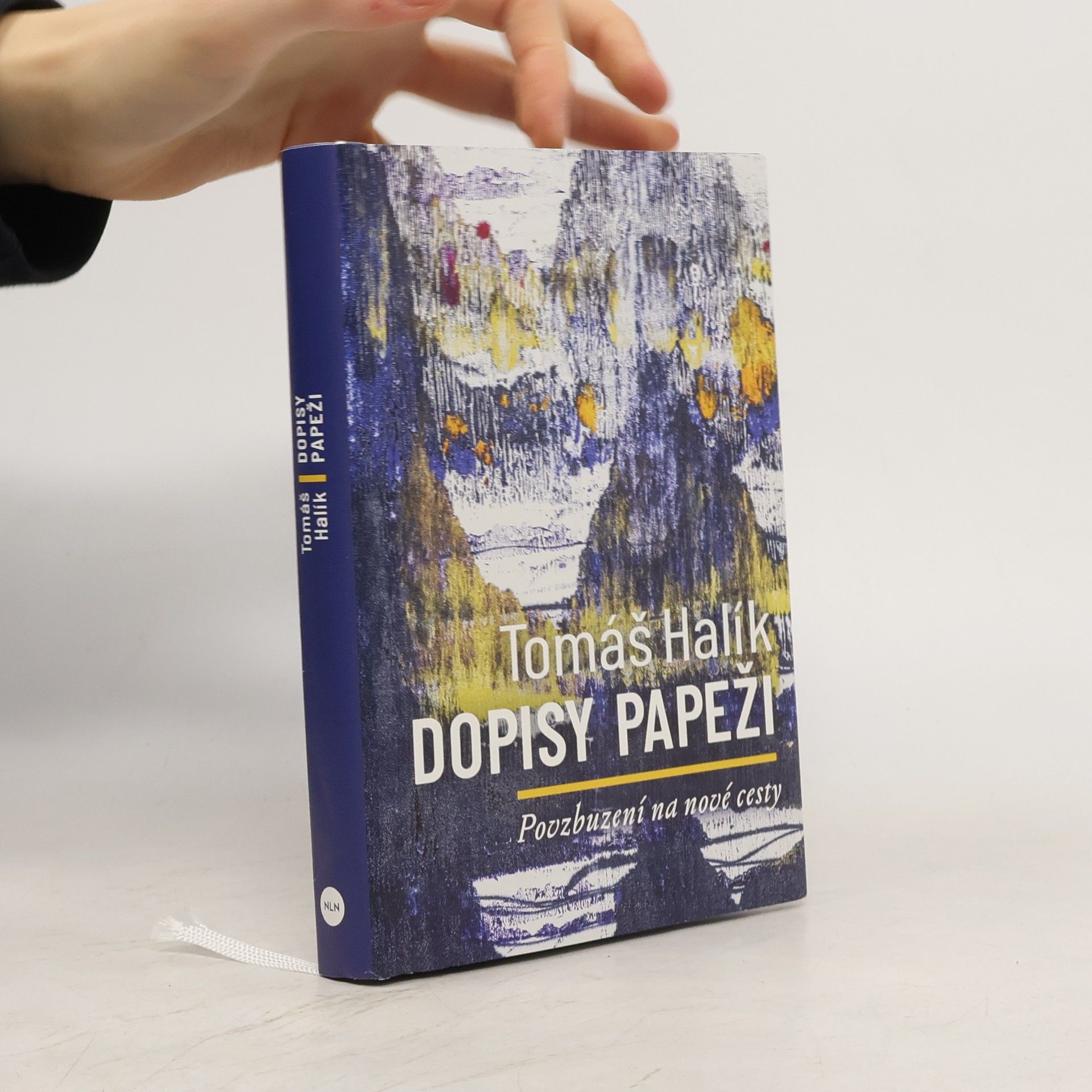Tomáš Halík thematisiert aktuelle Herausforderungen wie Missbrauchsskandale, Klimawandel und künstliche Intelligenz. Er skizziert das Ideal eines Papstes für Suchende, Raphael, und diskutiert mit ihm die Lage des Glaubens. Halík entwirft eine Vision einer ökumenischen Kirche der Menschlichkeit und bietet ein Bekenntnis der Hoffnung.
Tomáš Halík Book order (chronological)






Miałem sen. Na balkonie bazyliki świętego Piotra w Rzymie stał nowo wybrany papież, wyjaśniając tłumom sens swojego imienia – Rafael, oznaczającego „Boży lek” lub „Bóg uzdrawia”. Tak zaczynają się Listy do papieża, najnowsza książka ks. Tomáša Halíka, teologa, filozofa i psychoterapeuty. Adresatem listów jest „papież z krainy snów”, a znaczenie jego imienia ma inspirować do poszukiwania nowych dróg oraz zwiastować przemiany w Kościele. W dwunastu listach autor porusza palące problemy współczesnego Kościoła: przyczyny kryzysu, wewnętrzną siłę religii, wolność i odpowiedzialność, tradycjonalizm, progresizm, tożsamość, apostolskość oraz eschatologiczne kwestie zbawienia. Ks. Halík zaskakuje przenikliwością sądów i świeżością spojrzenia, proponując odważne poszukiwanie nowych dróg do Źródła wiary. Poszukujący nie potrzebują hierarchii ani patriarchalnego władcy, lecz ojca duchowego, który szanuje ich dojrzałość i autonomię. „Papież wszystkich poszukujących” z mojego snu to figura, która wspiera i inspiruje, a nie kontroluje.
Kniha Dopisy papeži rozvádí některé myšlenky autorova Odpoledne křesťanství a tvořivě navazuje na výzvu papeže Františka k synodální reformě křesťanství. Předkládá vizi křesťanství, které překračuje samo sebe ve vztahu k ostatním náboženstvím, k lidem duchovně hledajícím mimo tradiční náboženství i k spoluodpovědnosti za společenské i přírodní prostředí. Katolická církev musí vyjít z úzké konfesionální podoby („katolicismu“) k široce otevřené „katolicitě“ (všeobecnosti) a přitom neztratit, nýbrž nově a hlouběji pochopit svou identitu. V knize Dopisy papeži autor volí výsostně dialogický žánr: dvanáct dopisů adresuje fiktivnímu papeži Rafaelovi. Jeho jméno „Boží lék“ či „Bůh uzdravuje“ i podtitul knihy naznačuje její poselství: v době globálních krizí je třeba probudit terapeutickou sílu víry.
Das Geheimnis der Weihnacht
Advents- und Weihnachtspredigten voller Hoffnung
Was ist der wesentliche Kern der Weihnachtsbotschaft? Tiefgründig und bewegend bringt uns Tomáš Halík die spirituelle Bedeutung der biblischen Geschichten von der Erwartung und Ankunft des Erlösers nahe. Im Zentrum steht die Sehnsucht des Menschen nach Hoffnung und Freude in dunklen Zeiten – und die Antwort, die Gott darauf gibt. Ein erbauliches Buch für die besinnliche Zeit des Jahres.
Teksty rozważań popularnego czeskiego kapłana i duszpasterza, ks. Tomasza Halika, ilustrowane dziełami światowego malarstwa. Pomogą nam dogłębnie wniknąć w tajemnice naszej wiary i modlitewnie przygotować się do Wielkanocy. Słowom medytacji towarzyszą poruszające sceny Wielkiego Tygodnia, ukazujące dramatyczne zwroty akcji, które były udziałem naszego Zbawiciela w ostatnich dniach Jego ziemskiego życia. „Droga krzyżowa była ważnym wsparciem w naszej chrześcijańskiej formacji, odprawialiśmy ją potajemnie w lasach niedaleko Pragi, łącząc się z cierpieniami chrześcijan całego świata. Właśnie im, licznym chrześcijanom, którzy także dziś są niesłusznie prześladowani, chciałbym zadedykować tekst tej modlitwy” (ks. Tomáš Halik). Ks. prał. Tomáš Halík (ur. 1948 w Pradze) jest wykładowcą na Uniwersytecie Karola w Pradze. W czasach reżimu komunistycznego potajemnie otrzymał święcenia kapłańskie z rąk biskupa Aufderbecka w Erfurcie (Niemcy wschodnie), następnie pełnił posługę w „Kościele podziemnym”. Papież Jan Paweł II mianował go doradcą Papieskiej Rady ds. Dialogu z Niewierzącymi (1990); Benedykt XVI nadał mu tytuł prałata honorowego Ojca Świętego (2008). Został uhonorowany licznymi wyróżnieniami międzynarodowymi w tym Nagrodą Templetona (2014). Doktor honoris causa z teologii uniwersytetów w Erfurcie i Oksfordzie. Jego książki zostały przetłumaczone na 19 języków.
Wierz mądrze. Wierz dojrzale Co to oznacza: być dziś chrześcijaninem? Trzy książki o wierze poza schematami. Cierpliwość wobec Boga Jedna z najważniejszych książek teologicznych. Nagrodzona przez Europejskie Stowarzyszenie Teologii Katolickiej. Swoiste wyznanie wiary ks. prof. Toma Halka i zaduma nad dojrzałą wiarą oraz pułapkami myślenia religijnego. Czas pustych kościołów Niezwykle odważna książka ks. prof. Toma Halka. Czy puste kościoły w czasie pandemii to przyszłość chrześcijaństwa? Próba odpowiedzi na pytanie, w jakim kierunku zmierza Kościół i nasza cywilizacja. Popołudnie chrześcijaństwa Opus magnum ks. prof. Toma Halka. Głęboka psychologiczna, socjologiczna i teologiczna analiza kryzysu we współczesnym Kościele, a także wyzwanie rzucone naszej religijności. Czy na naszych oczach umiera chrześcijaństwo? Tom Halk - czeski duchowny, socjolog i filozof, najbardziej przenikliwy współczesny teolog. Laureat Nagrody Templetona.
Płomień, który rozświetla mrok Pandemia, kryzys ekonomiczny, wojny Jak wierzyć w kochającego Boga i Jego bliskość, kiedy wokół rozsypuje się świat? Czy Wcielenie naprawdę coś zmienia? Gdzie szukać Bożej obecności? Bóg jest niewysłowioną tajemnicą, ale chce stać się zrozumiałym dla ludzi. Kazania ks. Tomasa Halika są próbą uchwycenia tej tajemnicy i podzielenia się nadzieją na to, że nasze życie z Bogiem wciąż ma sens. Ewangelia na jedną z niedziel mówi: nawet jeśli wokół was ludzie będą umierać ze strachu, wy nie dajcie się owładnąć lękowi: nabierzcie ducha i podnieście głowy (Łk 21,28). W ciemności już pojawia się światło, którego mroki nie pochłoną.
Der Nachmittag des Christentums
Eine Zeitansage
Tomáš Halík, einer der bedeutendsten religiösen Autoren unserer Zeit, präsentiert sein wichtigstes Werk, an dem er jahrelang gearbeitet hat. Er analysiert die gegenwärtige Lage des Christentums und der Kirchen, kritisiert Klerikalismus, Isolationalismus und Provinzialismus in der Gesellschaft. Halík zitiert Papst Franziskus: „Wir leben nicht in einer Ära des Wandels, sondern erleben den Wandel einer Ära“ und erläutert die Auswirkungen dieses Wandels auf den Westen. Sein Fazit: Das Christentum befindet sich in einem „Mittagstief“, das die Gesellschaft lähmt und eine wesentliche prägende Kraft vermissen lässt. Halík zeigt Wege zu einem reiferen Christentum auf, das seine Bestimmung für die Welt erfüllt und eine neue, leidenschaftliche Spiritualität entfacht. Er skizziert eine dritte Aufklärung und eine neue Epoche des Christentums, die über die Grenzen des Kirchlichen hinausgeht und den Glauben als Lebensart in den Mittelpunkt stellt. Halík betont, dass nicht Strukturen, sondern eine neue Beziehung zur spirituellen Dimension des Glaubens die künftige Vitalität der Kirche fördern wird. Die gegenwärtige Krise könnte der Schlüssel zu einer neuen, „nachmittäglichen“ Epoche des Christentums sein, die echte universale Geschwisterlichkeit fördert. Ein wichtiges und lesenswertes Werk.




